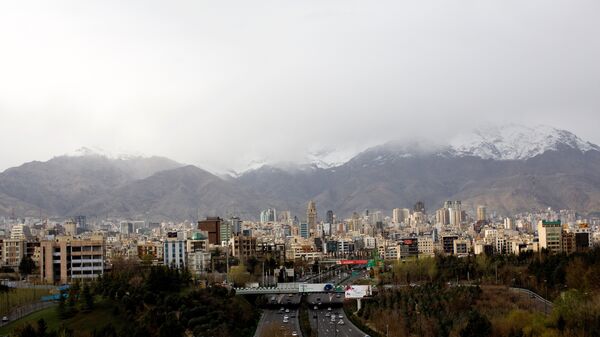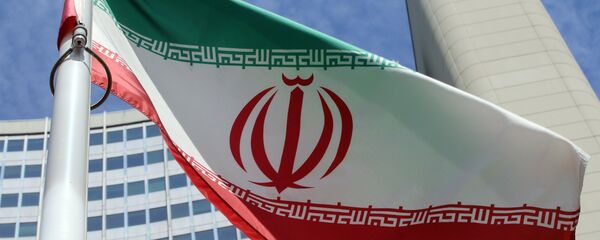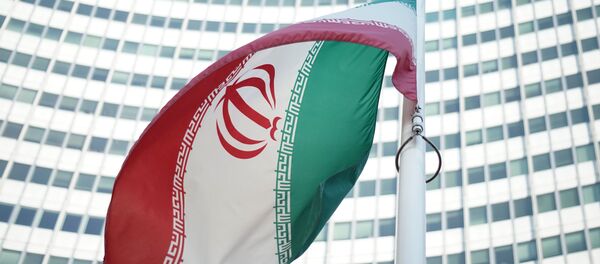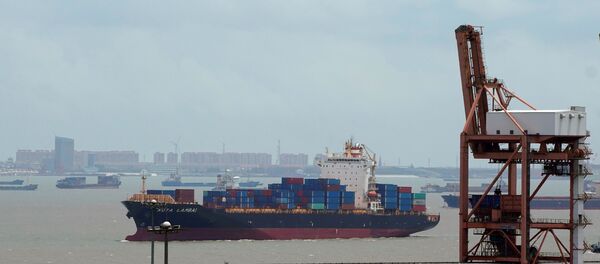The first wave of US sanctions, which took effect on Tuesday midnight, target Iran's acquisition of dollar bank notes, trade in gold and other metals, transactions related to the Iranian rial, and purchases of cars and commercial passenger aircraft.
The second round of sanctions, that will hurt the oil and gas industry in Iran and its energy sector, as well as the transactions with the Central Bank of Iran, is slated for November.
READ MORE: UK Encourages US to Talk With Partners, Iran About Way Forward — Williamson
‘Most Biting Sanctions Ever'
Earlier on Tuesday, US President Donald Trump announced the official roll-out of anti-Iran sanctions, which were previously lifted under the Joint Comprehensive Plan of Action (JCPOA).
"The Iran sanctions have officially been cast. These are the most biting sanctions ever imposed, and in November they ratchet up to yet another level. Anyone doing business with Iran will NOT be doing business with the United States. I am asking for WORLD PEACE, nothing less!" Trump wrote on Twitter.
The European Union, in turn, has reiterated that it would continue its trade and economic cooperation with Iran, with European Commission President Jean-Claude Juncker noting that Europe "has the law on its side."
The efforts taken by Europe, mainly France, Germany and the United Kingdom as signatories to the Iran nuclear deal, to preserve the budding trade and economic relations with Iran, however, put Europe on a direct collision course with Washington. Rarely has there been a sharper disagreement between the allies since the last world war.
European Response Only ‘Good On Paper'
To protect businesses investing in Iran from US sanctions, Europe has developed an updated version of the Blocking Statute, which was first used to counter US sanctions on Iran, Libya, and Cuba. The legislation bans European companies from complying with the US measures against Iran, and allows them to ignore extraterritorial judicial verdicts and recover damages arising from the sanctions "from the person causing them."
READ MORE: ‘Firms That Agreed to Engage in Iran are Now Worried About US Punishment' — Prof
The EU countermeasures are a weak response, as benefits of doing businesses with the United States would always outweigh any prospects of trade with Tehran, Aldo Carcaci, a member of the Belgian parliament, told Sputnik.
"[EU countermeasures are] good on paper but it leaves the executives in companies active on the Iranian market, either in trade or production, with the tough choice of obeying the American order or obeying the EU. The choice will be quickly made. I have been an executive in large technological companies in the past; a company would not take such risks. Companies will leave Iran, starting with the largest ones. Total will be replaced by Chinese companies. It is a blow to European business, and only small companies will ‘fly under the American radar’ and continue trading," Carcaci said.
He suggested that Europe would ultimately work out some mechanism to continue mutual trade under the Iran nuclear deal, ensuring a certain flow of supplies and payments and thereby keeping the nuclear deal valid. The sides, however, would inevitably see a fall in trade, according to the lawmaker.
READ MORE: Trump: Anyone Doing Business With Iran Won't Be Doing It With US
Jean De Ruyt, Belgium’s former permanent representative to the European Union and a senior adviser at law firm Covington & Burling LLP in Brussels, also believes that the EU countermeasures would hardly be effective enough to persuade big companies to continue doing business with Iran.
"It is a European policy that is in total contradiction to the American policy: that doesn’t happen very often. Will the European tool be effective? It has never been tested before. The impact of the European ‘blocking statute’ will probably be mainly symbolic and insufficient to persuade big businesses to stay or engage with Iran. Any important European company will be afraid because the US arm is long," De Ruyt told Sputnik.
Meanwhile, the EU countermeasures also include a financial aspect – enabling the companies to trade in non-dollar denominated currencies, so they do not risk falling under the eye of Washington.
Everybody, nonetheless, remembers that BNP Paribas, a giant French bank, had to pay a record $8.9 billion in the penalty to Washington for using the US currency in prohibited transactions with Iran, Sudan, and Cuba.
The European Investment Bank could have much contributed to the EU ongoing efforts in the financial sector, however, it preferred abstaining from risking its business model and playing an active role in Iran.
Time for European SMEs?
A worrying issue for the Iranians living for years under the US sanctions pressure is that of repair and maintenance of delicate technological equipment, be it planes, machine tools, elevators and escalators, automobiles and trucks, etc.
The fleet of aging Boeing planes of Iran Air or Mahan Air, for example, badly needs spare parts that the United States refuses to deliver. Amid struggles to produce copies of such components, Iran has even started producing its own smaller carrier (52 passengers), the Antonov A-140, based on technology transferred by Ukraine.
Turkish industrialist in Istanbul Ferhat Targit, in a comment to Sputnik, drew an example of elevator industry as one of a promising niche market for European SMEs.
"Everywhere in the world, the leading companies in the elevator industry are the American Otis, the Swiss Schindler or the German ThyssenKrupp. Not in Iran of course. It has become a thriving market for medium-size Italian or Spanish companies of the sector, installing mainly hydraulic elevators in Iranian cities and training the local maintenance teams. There are also many Turkish SMEs delivering spare parts and components, to repair or upgrade older elevators that had been installed by large multinationals, which have left Iran a long time ago. An elevator can have a lifetime of 50 years and more," Targit said.
READ MORE: Germany to Protect Its Companies' Exports, Investments in Iran From US Sanctions
Adnan Tabatabai, an adviser to the German government and the CEO of the Centre for Applied Research in Partnership with the Orient (CARPO) in Bonn, also expressed hope that the vacuum left by big businesses would be, at least partly, filled by the SMEs, which do not depend on the US market.
"I have great doubt in its [EU Blocking Statute] effectiveness for all the major companies that also have activities in the US [such as] Airbus, Daimler, Siemens, Total or Renault will pull out of Iran, no doubt. They have too much to lose on the American market where they are also active. In that sense, the secondary sanctions of Donald Trump will be very effective. What can be hoped for is that the vacuum left by the large multinationals, will be filled in many sectors, by smaller European firms that don’t have activities across the Atlantic. SMEs would not compensate for the loss in its entirety, but there is some hope," he said.
Tabatabai noted that trade with Iran could be also connected with the "public relations issue," noting that many multinational companies would be afraid of the "bad press" related to the US-sanctioned activities in Iran.
US-Iran Talks Unlikely Amid Zero Trust in Washington
Tabatabai also suggested that the US move would further contribute to Tehran’s drifting toward its Eastern partners, such as China, India, and Russia, which is in the interests of neither Europe nor the United States.
"For large projects, of course, Iran can turn to countries such as China, Russia or India. Iran will turn more to Eastern powers. This is not in the interest of Europe. For Iranians, developing economic ties with China has a negative impact on employment in Iran. Since China applies barter agreements, through which for example, they will deliver fruit and agricultural products against oil or gas, this will negatively impact Iranian employment in agriculture," he argued.
As for the possible revival of the Iranian nuclear program, the expert dismissed the risk of Tehran adopting a confrontational approach, noting that other countries might advocate for a military approach.
"Could [Iranian] President [Hassan] Rouhani veer to the extreme and relaunch the Iranian nuclear programme? I don’t believe so. It is true that many Iranians point at the attitude of Trump in front of North Korea; it is because Kim has the nuclear bomb that he is respected by Washington. For Rouhani, a confrontational attitude would contradict the Islamic Republic’s will for peace. He will not champion a military approach, but others might," Tabatabai said.
READ MORE: 'Psychological Warfare': Iran's President Slams New US Sanctions
The chances that Tehran would agree to once again sit down at the negotiating table with the United States, which backtracked on its JCPOA commitments, are similarly low.
"The proposal by Donald Trump to discuss with President Rouhani of Iran, without pre-conditions, is just talk. How could the Iranians sit down with somebody who has broken a diplomatic deal and can’t be trusted?" Belgian lawmaker Carcaci told Sputnik.
To sum up, the relief from the economic isolation that was celebrated in Iran once the nuclear deal was reached has turned out to be short-lived. The Iranian economy risks being crippled again for years.






